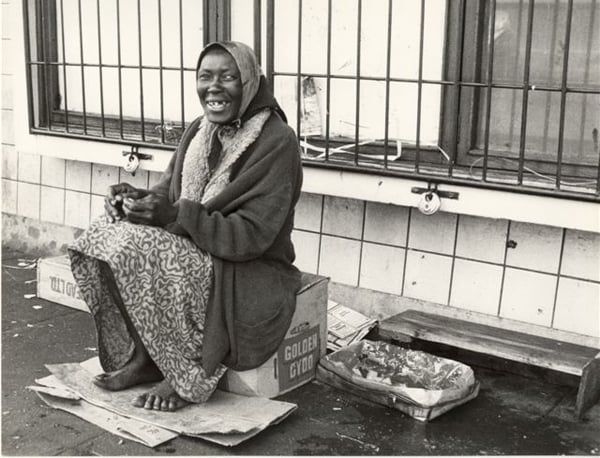People feared it would happen in the run up to the Vancouver 2010 Olympic Games, but it's happening today in cities across South Africa. With the 2010 FIFA World Cup looming, reports have surfaced that homeless people are being rounded up and forcibly removed before the eyes of the world turn to look upon South Africa.
Though the international media has picked up on the story with some vigour, from what I've observed working in Johannesburg's inner city these street sweeps seem to be nothing out of the ordinary.
Last August, as part of a campaign to tackle homelessness, the city's human development department took to the streets on a mission to stop people from giving money, food, clothes or blankets to the 3,000 or so homeless people living in Johannesburg's inner city.
"Their presence violates the city bylaws and we arrest them," Edna Mamonyane, spokeswoman for the Johannesburg Metro Police, said at the time. "This is a normal police exercise, but we have intensified our efforts because of the World Cup.
"We have had a tough job with the prostitutes -- every day they are warned or arrested," she added.
Reports claim that here in Johannesburg more than 800 people have been removed from the inner city area surrounding Ellis Park, where seven games, including a quarter-final, are to be held.
The campaign to remove homeless people from the public eye is defended by officials as being in line with the city's bylaws, which prohibit begging at intersections, as well as sleeping in streets, parks or any other public space.
Related to the forced removal of homeless people is the corresponding campaign, among the South African media and government officials, to vilify and dehumanize the homeless, in particular foreign nationals, in the run up to the World Cup.
Carte Blanche, a popular South African investigative television series, recently aired an exposé alleging that homeless women are renting babies for R20 per day (about $3 CAN) in order to earn more money begging at intersections.
On any given day, an estimated 300 mothers -- many of them Zimbabwean -- stand with their children at intersections across Johannesburg, begging from passing motorists. The exposé, like a number of other stories negatively portraying the homeless, serves to legitimize the street sweeps, and placate any concerns ordinary South Africans may feel for the homeless.
Significantly, much of Johannesburg's homeless population is made up of foreign nationals from other African countries, and there have been mounting concerns among the city's NGOs that xenophobic violence -- like that on May 2008, when 62 people were killed and hundreds of thousands of others displaced -- could erupt after the World Cup.
With its porous borders, its reputation as Africa's powerhouse and its close proximity to the ailing Zimbabwe, South Africa is a melting pot for other African immigrants -- both legal and illegal. But with such a large number of South Africans living in poor and destitute conditions, intolerance and contempt towards the country's foreign nationals, who are often considered to be a drain on the country's resources, is endemic.
Xenophobia is prevalent among all levels of South African society, from taxi drivers to police to social justice workers, and is rooted in legacies of colonialism and apartheid. The street sweeps are just one way the country's institutionalized xenophobia is playing out, and it could have drastic consequences for homeless people -- whether actual or perceived foreign nationals -- once World Cup fans return home.
In the weeks leading up to the Vancouver Olympics, I was touched by the way community and social justice groups united to protest the province's Assistance to Shelter Act. As the countdown to the World Cup comes to an end, I can only say that the lack of concern shown by local social justice groups and the general powerlessness of the homeless here in South Africa have been genuinely troubling.
We can only wait to see what the World Cup, and importantly, the weeks after, will bring. ![]()
Read more: Rights + Justice, Housing
















Tyee Commenting Guidelines
Comments that violate guidelines risk being deleted, and violations may result in a temporary or permanent user ban. Maintain the spirit of good conversation to stay in the discussion.
*Please note The Tyee is not a forum for spreading misinformation about COVID-19, denying its existence or minimizing its risk to public health.
Do:
Do not: